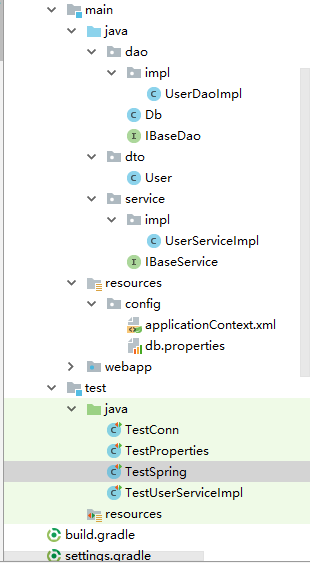bean
目录:
开始
接着上一篇
project的目录结构如下:
添加以下两spring的依赖包:
//spring依赖包
// https://mvnrepository.com/artifact/org.springframework/spring-tx
compile group: 'org.springframework', name: 'spring-tx', version: '4.3.14.RELEASE'
// https://mvnrepository.com/artifact/org.springframework/spring-webmvc
compile group: 'org.springframework', name: 'spring-webmvc', version: '4.3.14.RELEASE'
在java->resources->config下新建一个applicationContext.xml
内容如下:
<?xml version="1.0" encoding="UTF-8"?>
<beans xmlns="http://www.springframework.org/schema/beans"
xmlns:mvc="http://www.springframework.org/schema/mvc"
xmlns:tx="http://www.springframework.org/schema/tx"
xmlns:aop="http://www.springframework.org/schema/aop"
xmlns:context="http://www.springframework.org/schema/context"
xmlns:xsi="http://www.w3.org/2001/XMLSchema-instance"
xsi:schemaLocation="
http://www.springframework.org/schema/beans
http://www.springframework.org/schema/beans/spring-beans.xsd
http://www.springframework.org/schema/context
http://www.springframework.org/schema/context/spring-context.xsd
http://www.springframework.org/schema/mvc
http://www.springframework.org/schema/mvc/spring-mvc.xsd
http://www.springframework.org/schema/tx
http://www.springframework.org/schema/tx/spring-tx.xsd
http://www.springframework.org/schema/aop
http://www.springframework.org/schema/aop/spring-aop.xsd ">
<!--利用默认构造,指定属性进行bean的生成-->
<!--要求属性名称正确,且要有setter方法-->
<bean id="user" class="dto.User">
<property name="id" value="1"/>
<property name="username" value="2"/>
<property name="password" value="3"/>
</bean>
<!--自定义构造函数,指定属性进行bean的生成-->
<bean id="user1" class="dto.User">
<constructor-arg index="0" value="4"/>
<constructor-arg index="1" value="5"/>
<constructor-arg index="2" value="6"/>
</bean>
<bean id="userDao" class="dao.impl.UserDaoImpl">
</bean>
<bean id="userService" class="service.impl.UserServiceImpl">
<property name="udi" ref="userDao"/>
</bean>
</beans>
因为指定属性进行bean的生成,要求属性名称正确,且要有setter方法,所以还要修改一下User.java,如下:
package dto;
public class User {
private int id;
private String username;
private String password;
public User(){
}
public User(int id, String username, String password) {
this.id = id;
this.username = username;
this.password = password;
}
//右键->Generate->Getter and Setter
public int getId() {
return id;
}
public void setId(int id) {
this.id = id;
}
public String getUsername() {
return username;
}
public void setUsername(String username) {
this.username = username;
}
public String getPassword() {
return password;
}
public void setPassword(String password) {
this.password = password;
}
//右键->Generate->toString()
@Override
public String toString() {
return "User{" +
"id=" + id +
", username='" + username + '\'' +
", password='" + password + '\'' +
'}';
}
}
还要修改一下UserServiceImpl.java,为UserDaoImpl加上setter方法,如下:
package service.impl;
import dao.impl.UserDaoImpl;
import dto.User;
import service.IBaseService;
import java.sql.SQLException;
import java.util.List;
import java.util.Map;
//服务层实现
public class UserServiceImpl implements IBaseService<User>{
// 持久层对象
UserDaoImpl udi;
public void setUdi(UserDaoImpl udi) {
this.udi = udi;
}
@Override
public boolean add(User user) throws SQLException {
return udi.add(user);
}
@Override
public boolean update(User user) throws SQLException {
return udi.update(user);
}
@Override
public boolean delete(User user) throws SQLException {
return udi.delete(user);
}
@Override
public User findById(int id) throws SQLException {
return udi.findById(id);
}
@Override
public List<User> findByProp(Map map) throws SQLException {
return udi.findByProp(map);
}
}
测试
测试代码如下:
test/java/TestSpring.java
import dto.User;
import org.junit.Before;
import org.junit.Test;
import org.springframework.context.ApplicationContext;
import org.springframework.context.support.ClassPathXmlApplicationContext;
import service.impl.UserServiceImpl;
import java.sql.SQLException;
public class TestSpring {
//定义一个spring容器
ApplicationContext ac;
//得到容器上下文
@Before
public void init() {
ac = new ClassPathXmlApplicationContext("config/applicationContext.xml");
}
@Test
public void test() throws SQLException {
//将bean注入到此处
User user = ac.getBean("user", User.class);
System.out.println(user);
User user1 = ac.getBean("user1", User.class);
System.out.println(user1);
UserServiceImpl usi = ac.getBean("userService", UserServiceImpl.class);
System.out.println(usi);
}
}
效果
看到如下结果则说明有生成bean。

